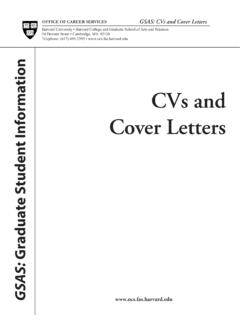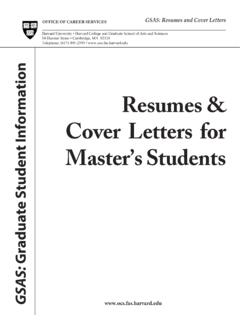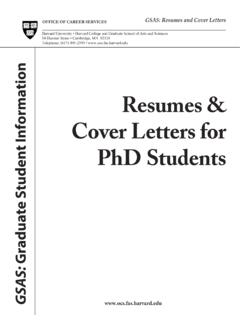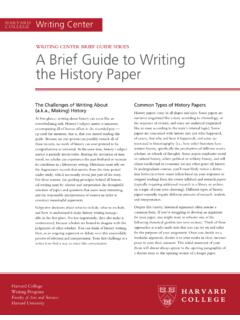Transcription of INTERVIEWING - Harvard University
1 Undergraduate Resource SeriesOffice of Career Services | 54 Dunster Street Harvard University | Faculty of Arts and Sciences | 2021 President and Fellows of Harvard CollegeAll rights part of this publication may be reproduced in any way without the express written permission of the Harvard University Faculty of Arts & Sciences Office of Career Services. 07/21 Office of Career Services Harvard University Faculty of Arts & Sciences Cambridge, MA 02138 THE INTERVIEW uring an interview, potential employers try to assess the following: Your qualifications for the position. Your "fit" with the employer or organization. How well you have considered your reasons for applying.
2 How clearly you can express your potential contributions to the organization. Your transferable skills such as communication and professionalism. Your knowledge of the organization and level of interest in the position. In essence, the interviewer wants to know: Why should we hire you? employers are looking for applicants who are focused and mature, understand the work the company is doing and the requirements of the position for which they re INTERVIEWING , and can communicate how their skills can be used to meet those requirements. They want to hire people who are cooperative, organized, and hard-working. Therefore, it s important to be as prepared as possible before your interview.
3 Below are some suggestions for improving your INTERVIEWING skills: Research the company, field, and position Before the interview, read the employer s website and review any online material relevant to the role and position or (when applicable) print material you may have previously picked up at career fairs or other hiring events. Be sure to stay current on industry news by reading daily news sources. Conduct a Google search on the organization the day of the interview to be current on any new developments. Utilize Harvard online subscriptions such as Vault (which can be found on the OCS website) for additional industry and company information. Whenever possible, attend any networking and information sessions the employer is having or connect with someone who works there to increase your visibility and to gather additional information.
4 Use the Harvard Alumni Association alumni database and LinkedIn to identify alumni to reach out to. Know your resume Be prepared to discuss everything on your resume. Remember that your resume is the only information most employers will have about you. Expect questions about your choice of activities, professional experiences, concentration, and thesis (if applicable). employers and organizations are interested in knowing how you've chosen to spend your time and energy, and why. Help your interviewer get to know you and differentiate you from other students. Don't be too brief when answering "what and why" questions, but don't ramble, either. Expand on your experience and skills.
5 Focus your responses on how these relate to the position for which you re INTERVIEWING . Practice answering interview questions The old saying, practice makes perfect certainly applies to the INTERVIEWING process. Practice doesn t imply that you are memorizing answers to questions, but are instead assessing how you answer questions, whether you re making eye-contact and seem interested, seeing if your explanations are clear, and understanding the reasoning behind D From a recent employer: All Harvard candidates are capable of doing the job. What distinguishes the candidates is the level of interest. certain questions as well as how to connect your experience to them.
6 You can practice with roommates, family, friends, tutors, and by appointment with advisers at OCS. The more experience you have articulating your thoughts and highlighting your skills, the more effective and polished you will be. There are a variety of resources available that offer helpful strategies. Many of these resources are available through the OCS website, including InterviewStream. Additionally, OCS offers a number of INTERVIEWING workshops. Refer to the Events section of the OCS website for dates and times. Prepare some questions to ask an employer These questions will help you obtain the information needed to make an informed decision and also reiterate your interest in the position.
7 Make sure you know the next step in the process before you leave. Ask, When might I expect to hear from you? and, if applicable, indicate your continued interest in the position. Make sure your attire is appropriate A well-groomed, professional appearance is essential. Anything else will detract from the best possible presentation you can make. Decide what to wear well before the day of the interview. A good way to determine suitable attire is to look at what people typically wear in the organization or industry for which you re INTERVIEWING . Generally plan to wear a fairly formal outfit in a dark color. In some creative and technical fields you may have more leeway in terms of formal vs.
8 Casual attire, but it s always safe to err on the formal side. Avoid: wild ties, attention-grabbing jewelry, strong scents, and bold colors. Attire Corporate Dress (for interviews) dark suit with a light shirt or tailored dress conservative tie/simple jewelry dark/polished closed-toe shoes Business Casual (for employer events) khakis, dress pants, or skirt button-down long-sleeve shirt, sweater set, or blouse have a blazer handy See the OCS Dress for Success web page for ideas on interview attire at Map out the location or test your technology Confirm your day, time, and method of communication. For virtual interviews, check your tech and internet connection.
9 If traveling, plan your trip ahead of time, especially if you are in a major urban area or INTERVIEWING at a time when traffic may delay your travel. Plan to arrive 10-15 minutes early so that you can relax and compose yourself. If you arrive earlier, wait, and review your notes. For virtual interviews you can show up 1-2 minutes early. Have a good attitude Project enthusiasm, confidence, and a positive attitude! Convey the message that you are the best candidate for the position, and that this is the employer for whom you want to work. A job interview is not the place to be "laid-back;" it s up to you to sell yourself for the position. Market your skills and experience to fit the job requirements, which you would know from careful and extensive research of the employer.
10 Be professional, polished, and confident. What to bring with you to an interview: Extra copies of your resume Pen and paper or padfolio Writing samples (if appropriate for the industry) When invited to a full day of interviews, bring a bottle of water and a snack such as a granola bar. Often the employer will provide refreshments but just in case they don t, these will come in handy. Take a moment between interviews to recharge out of sight of your interviewers. INTERVIEW TYPES Behavioral/Fit Interviews Many employers use a Behavioral Interview to assess candidates skills and fit with their organization. The principle behind this type of interview is that past behavior is a good predictor of future behavior.










